
Michael Romero cleans a Line B station. (Photo: Aurelia Ventura)
In 2014, Michael Romero was living a stable life. He worked as a senior accountant for a telecommunications company and rented an apartment in Toluca Lake near Universal Studios.
In early 2020, he decided to leave his job and start his own consulting business in the same field. But when the pandemic hit, his clients stopped paying, and debts began to pile up.
“COVID completely wiped me out—I lost everything,” Michael recalls. To cover his expenses, he used his savings and sold his belongings. Eventually he was forced to leave his apartment.
Without a home, he stayed with relatives for a time before ending up sleeping in his car. “I would park anywhere warm just to get through the night,” he says. The only things he refused to sell were his tools, which he used to do maintenance work in private homes to earn enough money for basic needs.
“I was unhoused for almost a year-and-a-half,” Michael says. “I had been in the Navy and the Coast Guard, so I had faced tough situations before, but this was different. I felt defeated.”
Everything started to change when a social worker told him about Room-to-Work, a Metro program that offers employment to unhoused individuals. The goal is to help participants get started in the transportation industry, beginning with part-time work as a custodian.

Michael Romero cleans a Line B station. (Photo: Aurelia Ventura)
Launched in June 2022, the initiative provides more than just a job. It also offers training and interview coaching to help participants transition into stable employment. Metro partners with community organizations such as the Los Angeles Homeless Services Authority (LAHSA) to connect people experiencing homelessness with this opportunity. Since its launch, Room-to-Work has provided employment to 87 people — offering them a pathway to stability — and more participants are currently in training to join the program.
“As a custodian, I make sure B Line stations are clean and free of hazardous materials like broken glass or spills on the floor,” explains Michael, who has been with Metro for nine months. “I think this is an excellent program that gives people a real chance to get back on their feet.”
Today, Michael has a stable home, is studying to earn his bachelor’s degree in business administration, and—now that he’s back on solid ground financially —has regained custody of his young son.
“Room-to-Work is definitely a second chance to start over,” he says.
A growing need for second chances
In 2024, more than 75,000 people in Los Angeles County were experiencing homelessness, according to LAHSA’s most recent count. Among them, nearly 3,000 were veterans.
Room-to-Work participants come from a variety of backgrounds, including veterans, individuals from disadvantaged communities, the justice impacted and those struggling to find employment.
Angélica García is another participant in the program. She joined Room-to-Work four months ago. “I clean railings, elevators, and remove small graffiti at C Line stations,” she says. “I try to keep everything as clean as possible for passengers.”

(Photo: Aurelia Ventura)
Her life changed drastically after a separation. Until then, she had been a stay-at-home mother, caring for her three children. But when she realized she could no longer afford the rent for her Pasadena apartment, she found herself without a home.
“My dad helped me out, but he passed away shortly,” she recalls. For a while, she stayed with her aunts, then had to sleep in her car. She received vouchers for temporary stays in hotels, but nothing was permanent. “Eventually, I lost my car too, and I had no idea what to do next,” she says.
Without a home or transportation, her children started missing school until one of their teachers called her. When the teacher learned what was happening, she referred Angélica to an organization that helps people experiencing homelessness. That’s when her caseworker introduced her to Room-to-Work.
“This program is amazing. I feel happy and at peace having a stable job,” says Angélica. “As a single mother, this opportunity helps me support my children, and my schedule — ending at 6:00 p.m. — allows me to spend time with them.”
Her goal now is to become a full-time Metro employee. “I feel comfortable with my team, and I see opportunities for growth,” Angélica says.

Angelica Garcia tries to keep the stations as clean as possible. (Photo: Aurelia Ventura)
For Angélica, Room-to-Work has been a helping hand in rebuilding her life. She knows firsthand how quickly things can change.
“When people see someone who is unhoused, their first reaction is often to judge,” she says. “I think that’s wrong because you never know what someone else is going through.”
Michael agrees. “Believe me, when you lose everything, you don’t know where to start again… It doesn’t hurt to be kind.”
For more information on shelters, employment, or services available in Los Angeles County, visit: www.lahsa.org/get-help.

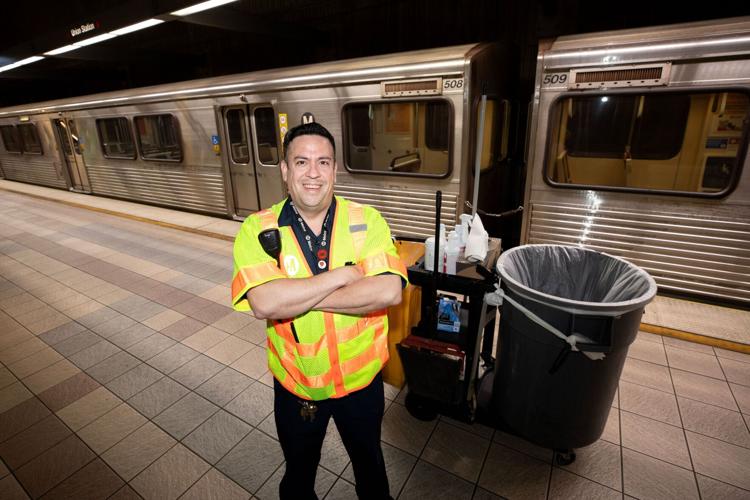
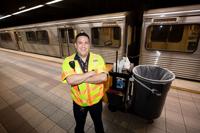

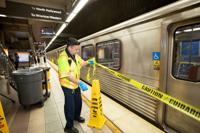

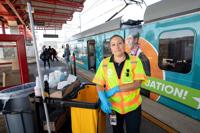

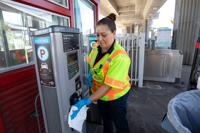

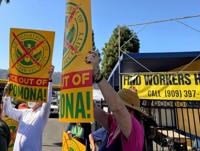



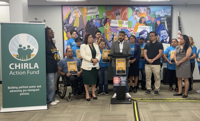


(0) comments
Welcome to the discussion.
Log In
Keep it Clean. Please avoid obscene, vulgar, lewd, racist or sexually-oriented language.
PLEASE TURN OFF YOUR CAPS LOCK.
Don't Threaten. Threats of harming another person will not be tolerated.
Be Truthful. Don't knowingly lie about anyone or anything.
Be Nice. No racism, sexism or any sort of -ism that is degrading to another person.
Be Proactive. Use the 'Report' link on each comment to let us know of abusive posts.
Share with Us. We'd love to hear eyewitness accounts, the history behind an article.